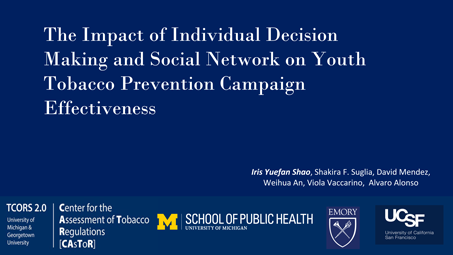“The impact of individual decision making and social network structure on anti-tobacco program effectiveness and disparities in adolescent tobacco use behavior” with Dr. Yuefan “Iris” Shao (University of California San Francisco)
- Contact the presenter
- Dr. Yuefan “Iris” Shao <yshao45@emory.edu>
- View Abstract +
- Several existing tobacco product regulatory actions and changes in tobacco product characteristics, such as required warning messages displayed on cigarette packaging, provide an excellent opportunity for prevention among adolescent tobacco product users. However, evaluating the impact and sustainability of these regulatory actions on long-term adolescent tobacco use behaviors still faces tremendous obstacles, especially given mixed evidence of effectiveness in different target populations and persisting disparities among the socially disadvantaged. Extensive evidence has shown that social networks have a significant impact on information diffusion and behavioral choices, which are key determinants of long-term effectiveness of tobacco product regulations. Using agent-based computational experiments, this project incorporated individual decision making and opinion dynamics over social networks into a social learning model to evaluate how individual decision making and diffusion over social networks collectively affect tobacco product regulation effectiveness. Findings from this project suggested that individual decision making and social network structural characteristics are both critical to the long-term effectiveness of tobacco product regulations. Ensuring communities’ openness to adopt novel opinions alone can lead to reduced prevalence of harmful behaviors. When taking into consideration the presence of social networks, the presence of a highly clustered network does not imply more necessity or higher effectiveness of tobacco product regulations as a result of network-based diffusion. Paradoxically, in more scattered networks with longer average path length, regulatory actions targeting individual incentives may be more effective. Findings from our model highlighted the importance of individual inertia in decision making in shaping the outcomes of tobacco product regulations.
- View Bio +
- Iris Yuefan Shao, PhD, MPH is currently a Postdoctoral Research Scientist at University of California San Francisco. Dr. Shao completed her PhD in epidemiology from Emory University Rollins School of Public Health in 2022. Her research focuses on the effectiveness evaluation of complex behavioral intervention strategies targeting modifiable health behavior and substance use among adolescents. In particular, she is interested in bringing together sociopsychological theories and empirical research methods using systems science approaches.
 Dr. Yuefan “Iris” ShaoUniversity of California San Francisco
Dr. Yuefan “Iris” ShaoUniversity of California San Francisco
